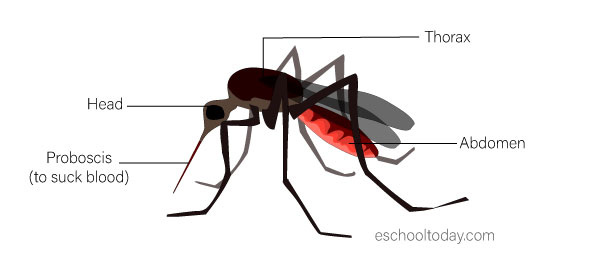- Malaria
Malaria. What is it?
Malaria is a common but deadly infection in hot, tropical areas of the world. Malaria (although rarely) can also occur in temperate climates. Malaria is caused by a parasite known as Plasmodium, injected into your body (blood) by the bite of the female anopheles mosquitoes.
Experts say Malaria is a disease of poverty — afflicting primarily the poor who tend to live in malaria-prone rural living places that offer very little or no barriers against mosquitoes.
It is common in many areas in Africa because of its wet, humid and hot climate. The dampness and warmth provide perfect breeding conditions for mosquitoes. These mosquitoes usually bite between dusk and dawn.

This is an illustration of a mosquito. It is a tiny insect.
The colors used here are only suggestive.
FACTS
Estimated deaths from malaria globally:
- 2019: 409 000 (ISBN 978-92-4-001579-1 (electronic version))
- 2018: 405 000
- 2017: 416 000
- 2010: 585 000
Between 2010 and 2018 the incident rate declined globally from 71 to 57 cases per 1000 population at risk.
Source: World malaria report 2019. Geneva: World Health Organization; 2019. Licence: CC BY-NC-SA 3.0 IGO. ISBN 978-92-4-156572-1
It is estimated that more than 400 000 people die of malaria each year. about 70% of them are children under the age of five.
Is there a vaccine for Malaria?
For many decades, there has been intense research into finding a malaria vaccine, but there has not been any available commercially. One that is being used in the meantime is called RTS,S/AS01. Currently, there are about seven countries in Africa, including Ghana, Gabon, Kenya, Mozambique, Tanzania, Burkina Faso, and Malawi who are participating in a clinical trial for the vaccine. Later this year (2014) the World Health Organisation (WHO) may recommend the use of the vaccine from 2015.
